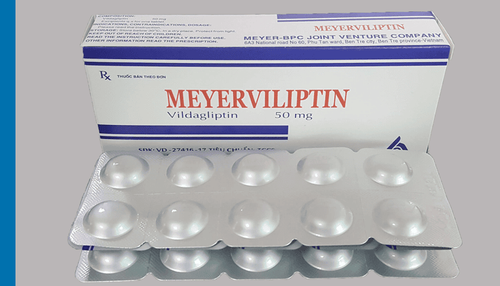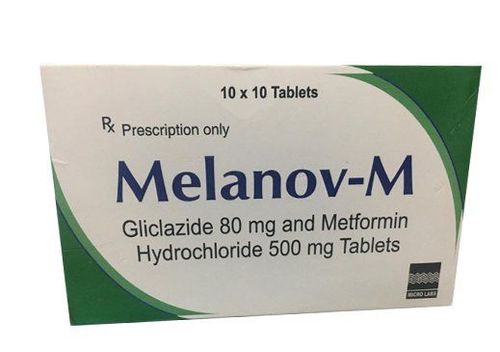This is an automatically translated article.
Metformin has been shown to be effective in the treatment of type 2 diabetes of the Biguanide group. So what is Metformin 850mg?1. What is Metformin 850mg?
Metformin 850mg is an antidiabetic drug containing the main ingredient is Metformin of the biguanide group. Metformin is effective in reducing plasma glucose concentrations in patients with type II diabetes mellitus (non-insulin dependent diabetes mellitus).
2. Uses of Metformin 850mg
Treatment of non-insulin dependent diabetes mellitus (type II): Monotherapy, when the hyperglycemia cannot be treated with diet alone. Metformin may be used concomitantly with a sulfonylurea when diet and either metformin or a sulfonylurea alone do not provide adequate glycemic control.
3. Dosage of Metformin 850mg
Metformin 850mg is to be taken orally with or after meals.
Recommended dose: The starting dose for Metformin-naive patients is 500 mg once daily. If the patient does not experience gastrointestinal adverse reactions and the dose needs to be increased, the dose may be increased by 500 mg at intervals of 1 to 2 weeks. Dosage of Metformin should be adjusted on an individual basis and should not exceed a maximum dose of 2000 mg/day.
Adults: Start taking 1 tablet / day, take 1 time (taken at breakfast). Children ≥ 10 years and adolescents: Monotherapy and in combination with insulin: Initial dose: 1 tablet x 1 time/day. After 10-15 days, adjust dose based on glycemic index. The maximum recommended dose is 2 g/day, divided into 2 - 3 doses. Elderly: Dosage should be cautious because it can cause renal function decline. Elderly patients should not be treated up to the maximum dose of Metformin.
4. Contraindications
Metformin 850mg is contraindicated in the following cases:
Patients with a history of hypersensitivity to any component of the drug. Patients with acute catabolism, infection, trauma (must be treated with insulin) Decreased renal function due to renal disease, or renal dysfunction, or due to medical conditions such as cardiovascular collapse, myocardial infarction acute heart failure and sepsis. Patients with severe renal impairment Patients with acute or chronic metabolic acidosis, including diabetic ketoacidosis. Severe liver disease, severe heart disease, severe respiratory disease with hypoxia. Congestive heart failure, cardiovascular collapse, acute myocardial infarction. Chronic hypoxic lung disease. Severe infections, sepsis. Acute metabolic decompensation Pregnancy Temporarily discontinue Metformin in X-ray patients with iodinated contrast. Gangrene, alcoholism, malnutrition.
5. Notes when using drugs
Lactic acidosis: The world has recorded cases of lactic acidosis related to Metformin, including cases such as death, hypothermia, hypotension, prolonged bradyarrhythmias. If Metformin-related lactic acidosis is suspected, discontinue Metformin, seek medical attention promptly, and initiate emergency measures. Renal Impairment: The risk of Metformin accumulation and lactic acidosis increases with the severity of renal failure because Metformin is eliminated primarily by the kidneys. Drug interactions: Concomitant use of Metformin with certain drugs may increase the risk of lactic acidosis: patients with impaired renal function lead to significant hemodynamic changes, affecting acid-base balance or increase the accumulation of Metformin. Patients 65 years of age and older: The risk of Metformin-related lactic acidosis increases with the age of the patient. Perform diagnostic tests using contrast: Discontinue metformin before or at the time of an iodinated contrast scan in patients with a glomerular filtration rate of 30-60. ml/min/1.73 m2, patients with a history of liver failure, alcoholism, heart failure or who will use intravenous iodinated contrast agents. Surgery or other procedures: Metformin should be temporarily discontinued in patients with limited food and fluid intake. Inspiratory hypoxia: Some cases of metformin-associated lactic acidosis have occurred in patients with acute congestive heart failure (particularly those associated with hypoperfusion and hypoxemia). Cardiovascular collapse (shock), acute myocardial infarction, sepsis and other conditions associated with hypoxemia are related to lactic acidosis and may also cause prerenal azotemia. Discontinue Metformin when these events occur. Alcohol consumption: Alcohol has the potential to increase the risk of Metformin-related lactic acidosis. The patient did not drink alcohol during treatment with Metformin. Hepatic impairment: Patients with hepatic impairment may develop metformin-associated lactic acidosis due to impaired lactate elimination. Avoid use in patients with hepatic impairment Driving: The use of Metformin monotherapy has no effect on the ability to drive or use machines. However, there is still a risk of hypoglycemia when Metformin is used in combination with other antidiabetic agents (sulfonylureas, insulin, repaglinide). Pregnancy: Most experts recommend that insulin be used during pregnancy to maintain optimal blood glucose levels. Lactation: Metformin hydrochloride is excreted in human milk. Weigh the benefits and harms of the drug to the nursing infant. If metformin hydrochloride is discontinued and diet does not provide adequate glucose control, insulin therapy should be instituted.
6. Undesirable effects of drugs
The most common side effects of Metformin are gastrointestinal. These effects are usually dose related and usually occur at the time of initiation of treatment, the effects are usually transient. Common side effects such as:
Gastrointestinal: Anorexia, nausea, vomiting, constipation, diarrhea, epigastric pain, heartburn. Skin: rash, urticaria, photosensitivity. Metabolism: Reduced absorption of vitamin B12. Some rare side effects mainly manifested in hematology such as: blood dysplasia, aplastic anemia, hemolytic anemia, marrow failure, thrombocytopenia, agranulocytosis.
Please dial HOTLINE for more information or register for an appointment HERE. Download MyVinmec app to make appointments faster and to manage your bookings easily.













